Only 7 democrats will be on the stage for the last presidential debate of 2019
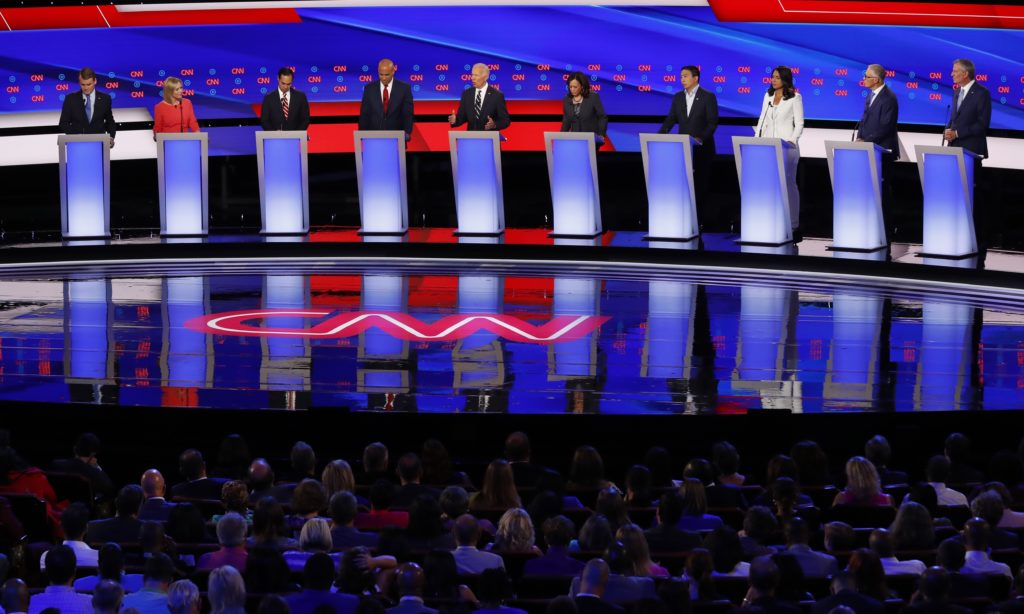
A winnowed field of Democratic presidential contenders takes the debate stage for a sixth and final time in 2019, as candidates seek to convince anxious voters that they are the party’s best hope to deny President Donald Trump a second term next year. Thursday night’s televised contest ahead of Christmas will bring seven rivals to heavily Democratic California, the biggest prize in the primary season and home to 1 in 8 Americans. And, coming a day after a politically divided House impeached the Republican president, the debate will underscore the paramount concern for Democratic voters: Who can beat Trump in November? With voters distracted by the holidays and the impeachment proceedings in Washington, the debate in Los Angeles could turn out to be the least watched so far. Viewership has declined in each round though five debates, and even campaigns have grumbled that the candidates would rather be on the ground in early voting states than again taking the debate stage. The lack of a clear front-runner reflects the uncertainty gripping many voters. Would Trump be more vulnerable to a challenge from the party’s liberal wing or a candidate tethered to the centrist establishment? Should the pick be a man or a woman, or a person of color? The Democratic field is also marked by wide differences in age, geography and wealth, and the party remains divided over issues including health care and the influence of big-dollar fundraising. There will be a notable lack of diversity onstage compared to earlier debates. For the first time this cycle, the debate won’t feature a black or Latino candidate. The race in California has largely mirrored national trends, with former Vice President Joe Biden, Vermont Sen. Bernie Sanders and Massachusetts Sen. Elizabeth Warren clustered at the top of the field, followed by South Bend, Indiana, Mayor Pete Buttigieg, Minnesota Sen. Amy Klobuchar, businessman Andrew Yang and billionaire philanthropist Tom Steyer. Conspicuously missing from the lineup at Loyola Marymount University on Thursday will be former New York City Mayor Michael Bloomberg, a billionaire who is unable to qualify for the contests because he is not accepting campaign donations. But even if he’s not on the podium, Bloomberg has been felt in the state: He’s running a deluge of TV advertising in California to introduce himself to voters who probably know little, if anything, about him. Bloomberg’s late entry into the contest last month highlighted the overriding issue in the contest, electability, a sign of the unease within the Democratic Party about its crop of candidates and whether any is strong enough to unseat an incumbent president. The eventual nominee will be tasked with splicing together the party’s disparate factions — a job Hillary Clinton struggled with after defeating Sanders in a long and bitter primary fight in 2016. Biden adviser Symone Sanders said to expect another robust exchange on health care. “This is an issue that is not going away and for good reason, because it is an issue that in 2018 Democrats ran on and won,” she said. Jess O’Connell with Buttigieg’s campaign said the candidate will “be fully prepared to have an open and honest conversation about where there are contrast between us and the other candidates. This is a really important time to start to do that. Voters need time to understand the distinctions between these candidates.” The key issues: health care and higher education. The unsettled race has seen surges at various points by Biden, Warren, Sanders and Buttigieg, though it’s become defined by that cluster of shifting leaders, with others struggling for momentum. California Sen. Kamala Harris, once seen as among the top tier of candidates, shelved her campaign this month, citing a lack of money. And Warren has become more aggressive, especially toward Buttigieg, as she tries to recover from shifting explanations of how she’d pay for “Medicare for All” without raising taxes. In a replay of 2016, the shifting race for the Democratic nomination has showcased the rift between the party’s liberal wing, represented in Sanders and Warren, and candidates parked in or near the political center, including Biden, Buttigieg and Bloomberg. Two candidates who didn’t make the stage will still make their presence felt for debate watchers with ads reminding viewers they’re still in the race. New Jersey Sen. Cory Booker and former Housing Secretary Julián Castro are airing television ads targeted to primary voters during the debate. Booker’s is his first television ad, and in it he says even though he’s not on the debate stage, “I’m going to win this election anyway.” It’s airing as part of a $500,000 campaign, running in Iowa, New Hampshire, Nevada and South Carolina, as well as New York, Washington, D.C., and Los Angeles. A pro-Booker super PAC is also going up with an ad in Iowa highlighting positive reviews of Booker’s past debate performances. Meanwhile, Castro is running an ad, in Iowa, in which he argues the state should no longer go first in Democrats’ nominating process because it doesn’t reflect the diversity of the Democratic Party. Both candidates failed to hit the polling threshold to qualify for the debates and have in recent weeks become outspoken critics of what they say is a debate qualification process that favors white candidates over minorities. By Kathleen Ronayne and Michael R. Blood Associated Press Associated Press writer Michelle L. Price in Las Vegas contributed to this report. Catch up on the 2020 election campaign with AP experts on our weekly politics podcast, “Ground Game.” Republished with the Permission of the Associated Press.
Turbulence shakes democrats going into final debate of 2019
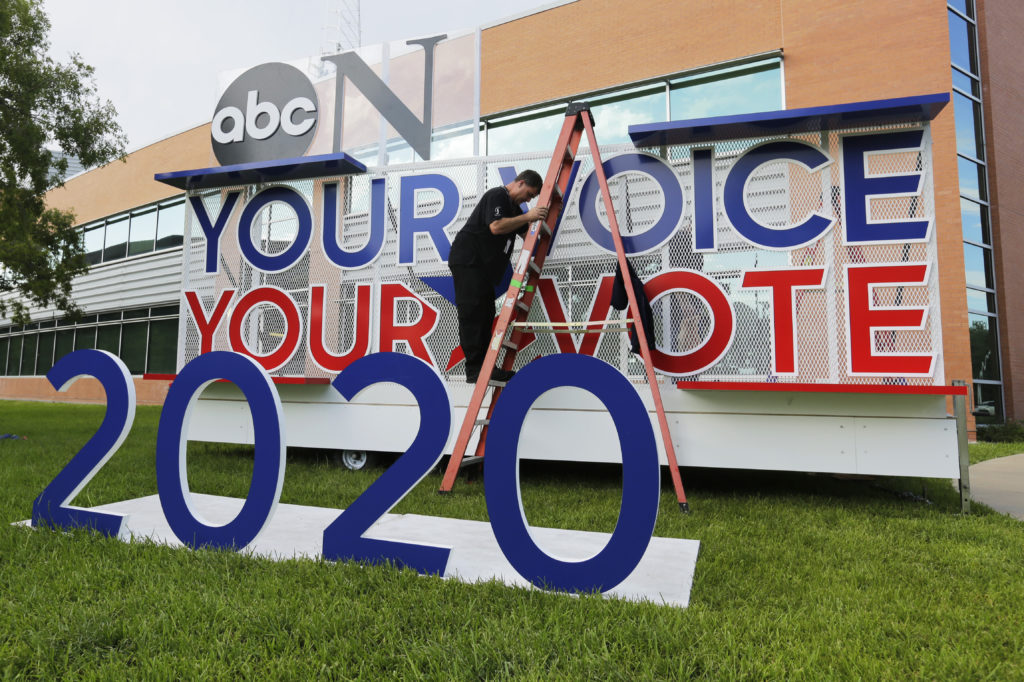
Seven Democratic presidential candidates will stand on stage this week in Los Angeles, a pool of survivors who have withstood almost a year on the campaign trail, sustained attacks from rivals in both major political parties and five rounds of high-pressure debates. And while the field has been effectively cut down from more than 20 in the span of six months, a deepening sense of volatility is settling over the Democratic primary on the eve of the sixth and final debate of 2019. The remaining candidates, those in the debate and some trying to compete from outside, are grappling with unprecedented distraction from Washington, questions about their core principles and new signs that the party’s energized factions are turning against each other. Lest there be any doubt about the level of turbulence in the race, it’s unclear whether Thursday’s debate will happen at all given an unsettled labor union dispute that might require participants to cross a picket line. All seven candidates have said they would not do so. The Democratic dilemma is perhaps best personified by Elizabeth Warren, whose progressive campaign surged through the late summer and fall but is suddenly struggling under the weight of nagging questions about her health care plan, her ability to compete against President Donald Trump and her very authenticity as a candidate. Boyd Brown, a South Carolina-based Democratic strategist who recently decided to back Joe Biden only after his preferred candidate, Beto O’Rourke, was forced from the race, likened Warren’s position to that of someone falling down a mountain grasping for anything to slow her descent. “She’s got real problems,” Brown said. Warren has avoided conflict with her Democratic rivals for much of the year, but she has emerged as the chief antagonist of the leading candidates in the so-called moderate lane, former Vice President Joe Biden and Mayor Pete Buttigieg of South Bend, Indiana. Seven weeks before Iowa’s Feb. 3 caucus, the Massachusetts senator is attacking both men with increasing frequency for being too willing to embrace Republican ideas and too cozy with wealthy donors. Those close to Warren hope the strategy will allow her to shift the conversation away from her own health care struggles back to her signature wealth tax and focus on corruption. Yet she could not escape questions about her evolving position on Medicare for All as she campaigned in Iowa over the weekend. When asked about health care, Warren told a crowd of roughly 180 people in the Mississippi River town of Clinton, Iowa, about a plan to expand insurance coverage without immediately moving to a universal, government-run system. She promised that those who wanted government health insurance could buy it before finally concluding, “At the end of my first term, we’ll vote on Medicare for All.” The next question came from a man who said he was on Medicare and mostly happy about it, but had lingering issues. “You call it Medicare for All and it’s better. Can’t you change the name?” he asked of her proposal. “I like your suggestion,” Warren responded, in a tone suggesting she wasn’t entirely joking. “Let’s call it health care for everybody.” She later added, “Let’s call it better than Medicare for All. I’m in.” Even entertaining a name change seemed to mark yet another shift for Warren, who first co-sponsored Medicare for All in 2017, but began pivoting away from the proposal after experts questioned the plan she released in October to pay for it without raising middle-class taxes. She subsequently released a “transition plan” promising to get Medicare for All approved by Congress by the end of her third year as president while relying on existing insurance plans, including those established by Obamacare, to expand health coverage in the interim. Warren’s Democratic critics suggest her evolution on the issue has stalled her momentum because it goes beyond a policy dispute and raises broader questions about what may be the most important personal quality in politics: authenticity. Indeed, Buttigieg, Biden and other rivals have seized on her shifts. Even Bernie Sanders, Warren’s progressive ally and Medicare for All’s author, seemed to pile on by promising to send a full bill to Congress implementing the measure during the first week of his administration. Without naming any of his rivals, Biden adviser Symone Sanders said candidates would not succeed in shifting the conversation away from health care this week even if they wanted to. She said to expect another “robust exchange” on the issue, which “is not going away and for good reason, because it is an issue that in 2018 Democrats ran on and won.” Tough questions for Warren haven’t just come from her rivals. Since Thanksgiving, she’s shortened her typically 30-minute and more stump speech to around 10 minutes and used the extra time to take more audience questions — only to be forced further on the defensive about health care. Barton Wright, a 69-year-old technical writer, pressed Warren on Medicare for All at a recent event in Rochester, New Hampshire, noting after the event that he wants a deeper explanation. “It just sounds awful,” Wright said. “It sounds ‘like Hemlock for All’ for people who don’t like Medicare. And that’s a lot of people.” Even after questioning Warren, however, Wright said he was helping her campaign and still plans to vote for her. Meanwhile, Buttigieg, the surprise member of the top-tier, is grappling with issues of his own that expose another fissure between the moderate and progressive wings of the party. Protesters aligned with Warren and Sanders tracked him across New York City last week banging pots and pans and calling him “Wall Street Pete” as he continued his aggressive courtship of wealthy donors. The 37-year-old seemed genuinely confused by the protests, which he was forced to acknowledge during at least one Manhattan fundraiser because the noise outside was so loud. As he faced supporters in Seattle over the weekend, Buttigieg acknowledged that the intra-party attacks will almost certainly continue, although he tried to downplay the intensity of the
Young Democrats gather in Birmingham for committee meeting

Young Democrats from across the country are gathering in Alabama this weekend. The Young Democrats of America organization is holding a national committee meeting in Birmingham over the weekend. Josh Coleman, president of the Alabama Young Democrats, said it is the first time Alabama is hosting the event. It is part of an outreach effort into Republican stronghold states traditionally thought of as deeply red, Coleman said. He said the event was a “great kick-off” to the rebuilding of the Alabama Democratic Party. The state party recently changed bylaws to make sure more young voters and other key constituencies are represented on the party’s governing board. Young voters are among those who helped elect Sen. Doug Jones in 2017, Rebecca Pinn, secretary of the Young Democrats of America, said in a statement about the meeting on the group’s website. The meeting began Friday and lasted through Sunday. Republished with the Permission of the Associated Press.
Judge Greg Griffin delays decision on suit over Alabama democratic chair

A lawsuit filed by the longtime chair of the Alabama Democratic Party challenging a newly elected leader can continue, at least for now, a judge said Thursday. Montgomery Circuit Judge Greg Griffin said he will wait for a decision from the Alabama Supreme Court in an earlier appeal before deciding whether to dismiss the lawsuit filed by longtime party chair Nancy Worley. “I’m going to let them rule,” Griffin told lawyers during a hearing. State Rep. Chris England and longtime party leader Nancy Worley each claim to be the properly elected party chair. The Democratic National Committee recognizes England as the state party leader after members of the state executive committee elected him this fall. Worley maintains the election was illegitimate and filed a lawsuit to try to block England from taking control. Griffin ruled that the DNC can intervene in the lawsuit. Barry Ragsdale, a lawyer representing the defendants in Worley’s suit, said, while they would prefer to have the lawsuit dismissed, England is functioning as party chair. Ragsdale said the new Democratic Party leaders have access to the state party’s social media accounts and the party headquarters in Montgomery. “The only people in the world that think that Chris England is not the chair of the Democratic Party were sitting at that table in there,” he said in reference to the plaintiffs’ attorneys. Ragsdale called the lawsuit Worley’s “last thread of trying to hang onto power.” Attorney Bobby Segall, who represents Worley and other plaintiffs, said it made sense to wait for the Supreme Court since the cases involved similar issues. Joe Reed, the party’s longtime vice chair for minority affairs and a supporter of Worley, attended the court hearing. Reed said a “party divided cannot win.” Reed predicted the legal fight will end up in federal court, arguing that new additions to the State Democratic Executive Committee violate a consent decree from the 1990s involving how committee members are selected. Republished with the Permission of the Associated Press.
Judge Greg Griffin schedules hearing in democratic party dispute

The legal fight over who is in control of the Alabama Democratic Party is dragging onward. Montgomery Circuit Judge Greg Griffin has scheduled a Dec. 5 hearing on a motion to dismiss the lawsuit filed by one side of the ongoing squabble. Both State Rep. Chris England and longtime party leader Nancy Worley claim to be the properly elected party chair. The Democratic National Committee recognizes England as the state party leader after members of the state executive committee elected him this month. Worley maintains the election was illegitimate and filed a lawsuit to try to block England from taking control. The two factions have been battling for control of the party. Republished with the permission of the Associated Press.
Democrats prep for open hearings, seek John Bolton testimony
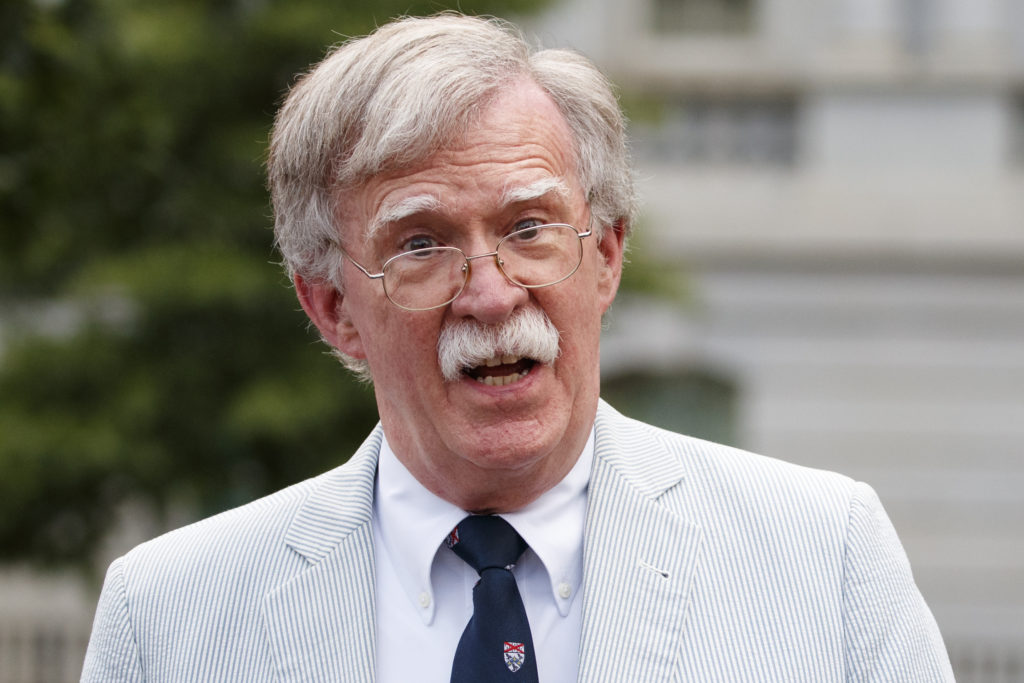
For only the fourth time in U.S. history, the House of Representatives has started a presidential impeachment inquiry. House committees are trying to determine whether President Donald Trump violated his oath of office by asking Ukraine to investigate political rival Joe Biden and his family, and to investigate the country’s involvement in the 2016 U.S. presidential election. A quick summary of the latest news and what’s to come: MOVING INTO PUBLIC VIEW The chairman of the House Intelligence Committee, Rep. Adam Schiff, told The Associated Press on Friday that the three committees leading the impeachment investigation plan to begin releasing transcripts of closed-door interviews as soon as early this week. The committees have interviewed current and former officials from the State Department and White House who have expressed concerns about Trump’s efforts to urge Ukraine to investigate Biden and his family. California Rep. Jackie Speier, a Democratic member of the Intelligence Committee, told CBS’ “Face the Nation” on Sunday that she expects one more week of closed-door interviews before committees move into open hearings. It’s so far unclear who will be asked to testify or how many hearings will be held. Leaders of the investigation say the hearings will be crucial to explain their inquiry to the American people. Schiff, Democrat-California said he hopes the testimony will eventually show “what the president did, why his misconduct is so serious” and how the “machinery of government” was pressed to help Trump influence the 2020 election. THE WHISTLEBLOWER A lawyer for the whistleblower who raised alarms about Trump’s dealings with Ukraine says his client has offered to answer written questions submitted by House Republicans.The surprise offer was made to Rep. Devin Nunes, the top Republican on the House Intelligence Committee. It would allow Republicans to ask questions of the whistleblower, who spurred the Democratic-led impeachment inquiry, without having to go through Schiff.Attorney Mark Zaid tweeted Sunday that the whistleblower would answer questions directly from Republican members “in writing, under oath & penalty of perjury,” part of a bid to stem escalating efforts by Trump and his GOP allies to unmask the person’s identity. Only queries seeking the person’s identity won’t be answered, he said. Nunes hasn’t commented on the proposal. Rep. Jim Jordan, an Ohio Republican and member of the House Judiciary Committee who has been highly critical of the impeachment process, said in a statement that written answers wouldn’t be sufficient to probe and cross-examine the whistleblower. The whistleblower raised concerns about Trump’s July 25 call with Ukrainian President Volodymyr Zelenskiy, in which he pressed Zelenskiy to investigate Trump’s political rivals. MORE BEHIND CLOSED DOORS As they prepare to go public, impeachment investigators are continuing to schedule private depositions. Democrats have called in 11 witnesses this week, including Energy Secretary Rick Perry and former national security adviser John Bolton. It’s unclear whether any of them will come to Capitol Hill. Perry is the first member of Trump’s Cabinet asked to appear before the House. His testimony is scheduled for Wednesday, according to an official working on the impeachment inquiry who spoke wasn’t authorized to publicly discuss the planning and spoke on condition of anonymity. Energy Department spokeswoman Shaylyn Hynes indicated Friday that Perry would not appear for the closed-door hearing but would consider testifying in a public session.On Bolton, Schiff said he “has very important information about the president’s misconduct that the American people should hear.” Other witnesses in the inquiry have described Bolton’s concerns as Trump urged the Ukrainian investigations. The committees have invited Bolton to appear Thursday but not issued a subpoena for his testimony. Trump says he’s not going to insist that Bolton not testify. Bolton’s lawyer has said he will not appear without a subpoena. “It’s up to him and it’s up to the lawyers,” Trump told reporters. The committees also have scheduled and subpoenaed other witnesses from the White House and State Department. They include David Hale, an undersecretary at the State Department who has been mentioned in previous testimony. Key witnesses last week included Alexander Vindman and Tim Morrison of the National Security Council. Morrison, who stepped down the day before his testimony, confirmed that military aid to Ukraine was held up by Trump’s demands for the investigations. But Morrison testified that there was nothing illegal, in his view, about the quid pro quo at the center of the impeachment inquiry. Vindman testified that he had raised concerns about Trump’s pleas. COURT BATTLES Democrats are also fighting impeachment battles in court, though they have indicated that they don’t want to delay the investigation as those cases proceed. One witness called by Democrats, former National Security Council deputy Charles Kupperman, has asked a judge to decide whether he must appear before Congress. Trump has said his administration will not cooperate, and Kupperman has said he is caught between the two. Kupperman’s lawyer, Charles Cooper, is also Bolton’s lawyer. He said Bolton could be added to the case. Republished with the permission of the Associated Press.
Democrats push candidates to fully commit to 2020 nominee
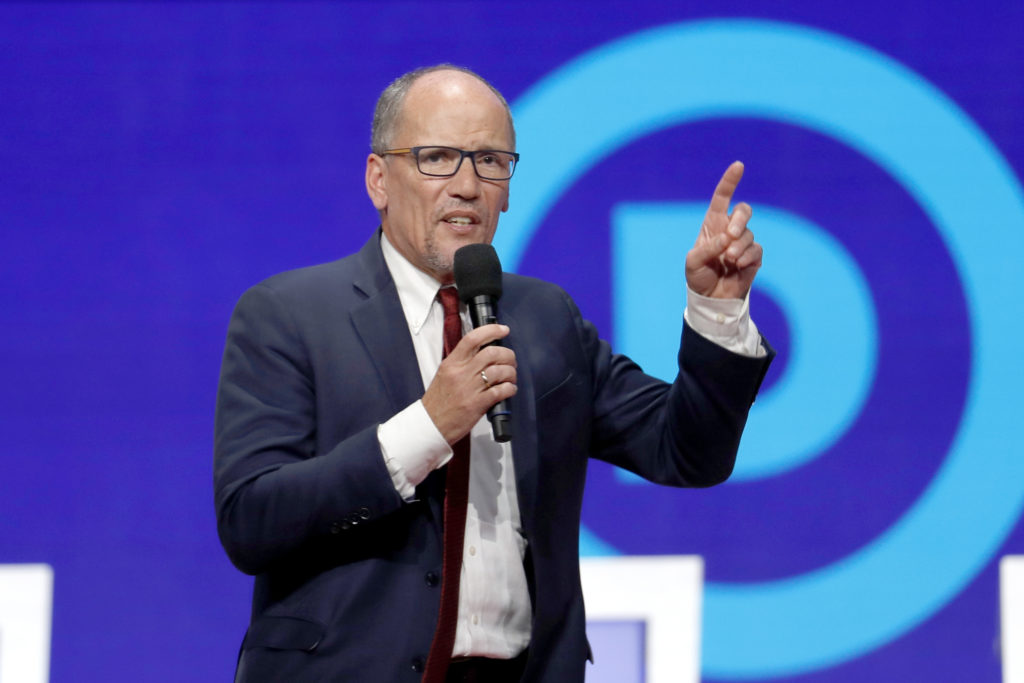
The Democratic National Committee is increasing pressure on its presidential candidates to commit to campaign actively for the party’s nominee in 2020, going beyond a previous loyalty pledge for White House hopefuls. The push from Chairman Tom Perez is part of a wide-ranging strategy designed to prevent the mistakes that cost Democrats the 2016 presidential election. It comes as the Republican National Committee continues to dwarf the Democratic Party in fundraising, while Democrats face the prospect of a bruising, expensive nominating fight that could last well into election year. “We’ll need every Democrat working together in order to defeat Donald Trump,” Perez said, repeating his pledge for a full national campaign even as most Democrats remain focused on the primary campaign. As an example, the DNC holds up former President Barack Obama, who is already raising money and remains neutral in a nominating fight that includes his vice president, Joe Biden, and who is already raising money for the party. An Oct. 25 email from Obama to grassroots donors produced the party’s best online fundraising day of the cycle, the DNC said, and the former president will headline a fundraising gala in California in November. DNC officials say Obama has already talked with party leaders about campaigning on behalf of the nominee, whoever it is. Perez is asking all candidates to commit, like Obama, to serve as surrogates, with a focus on battleground states in the weeks after the July 13-16 nominating convention in Milwaukee. And Perez wants each campaign, as candidates drop out, to designate a senior adviser to serve as a liaison to help the national party use the vestiges of individual candidates’ campaigns to build out Democrats’ general election campaign. DNC officials say the effort isn’t targeted at any campaign. But since President Donald Trump’s 2016 election, Democratic power players have lamented the bitterness that lingered among many supporters of Bernie Sanders after he lost the nomination to Hillary Clinton. Sanders endorsed and campaigned for Clinton, but some of his supporters never fully embraced her candidacy, and some Clinton loyalists blamed them for her narrow losses in key states like Wisconsin, Michigan and Pennsylvania. DNC officials say the overall purpose of what Perez calls a “unity effort” is to pool all Democratic resources, making them available to state parties in battleground states to benefit the presidential nominee and all other Democrats running for lower offices. Perez already has required candidates to pledge explicitly to support the nominee. Candidates also have been asked to help the party raise money and, as a condition of getting the DNC’s national voter file, pledge to give back the additional data they gather on voters once they drop out of the presidential race. The DNC says 10 candidates to date have sent fundraising emails and 15 have participated in fundraising events. That list includes Elizabeth Warren, who has shunned high-dollar fundraisers for her own campaign but agreed to help the party with events that include wealthy donors who legally can give the party hundreds of thousands of dollars. Sanders, Warren’s chief rival for the Democrats’ progressive faction, has sent a fundraising email but hasn’t yet hosted a DNC fundraiser. Sanders’ campaign says he is willing to attend such events provided they are open to low-dollar donors. Both Sanders and Warren have criticized Biden for leaning on wealthy donors and accepting the help of an independent political action committee that can accept unlimited contributions from individuals and corporations. The data requirements, meanwhile, are part of Democrats’ attempts to catch up to a Republican data operation that surprised the Clinton campaign in 2016 and to avoid the scenario under Obama, whose campaign ran its own sophisticated data operation but never fully integrated it with the party. Sanders also never turned over his voter data after ending his 2016 bid. By Bill Barrow Associated Press. Republished with the permission of the Associated Press.
Donald Trump exaggerates scope of cease-fire deal
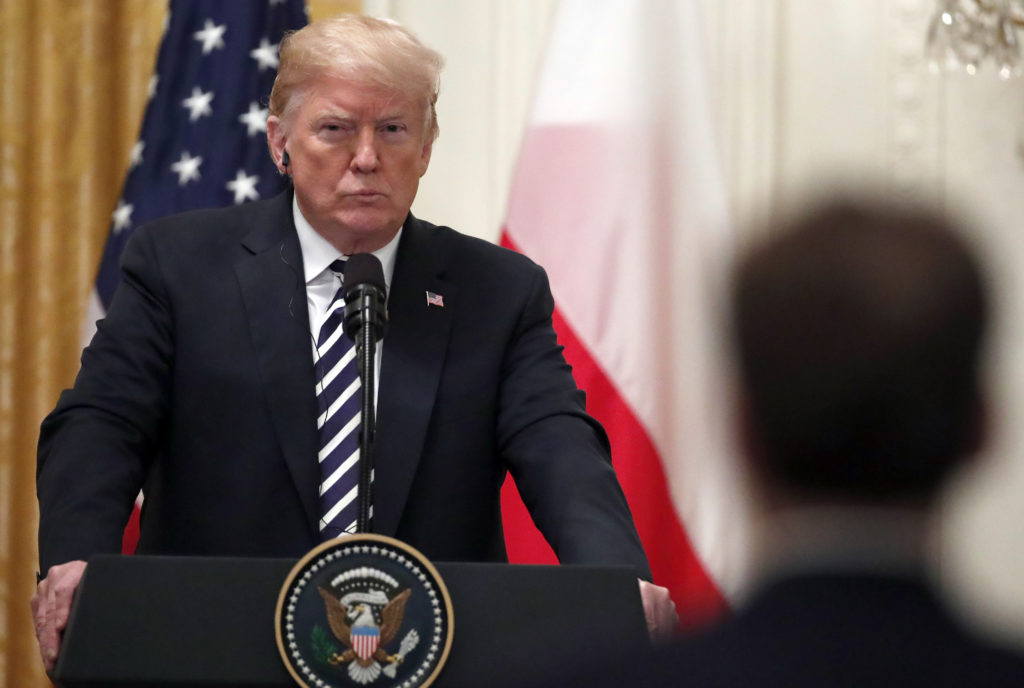
As President Donald Trump describes it, the U.S. swooped into an intractable situation in the Middle East, achieved an agreement within hours that had eluded the world for years and delivered a “great day for civilization.” It was a mission-accomplished moment that other Republican leaders, Democrats and much of the world found unconvincing. Trump spent much of the past week trying to justify his decision to pull U.S. troops away from America’s Kurdish allies in Syria, leaving those Kurdish fighters vulnerable on several fronts and already reeling from attacks by Turkish forces. In the process, Trump exaggerated the scope of a deal bringing a temporary cease-fire to Turkish-Kurdish hostilities, falsely suggested that U.S. troops in Syria will come home and mischaracterized the history of the conflict and even the geography of it. A look at his rhetoric on that topic and other subjects over the past week as well as a sampling of statements from the latest Democratic presidential debate: SYRIA TRUMP: “It’s time to bring our soldiers back home.” — news conference Wednesday. THE FACTS: That’s not what he’s doing. While the U.S. has begun what the Pentagon calls a deliberate withdrawal of troops from Syria, Trump himself has said that the 200 to 300 U.S. service members deployed to a southern Syria outpost in Al-Tanf will remain there. And on Saturday, Defense Secretary Mark Esper said the current plan calls for all U.S. troops who are leaving Syria to go to western Iraq, not home. They number more than 700. Asked Sunday why troops weren’t coming home as Trump said they would, his acting chief of staff, Mick Mulvaney, said: “Well, they will eventually.” TRUMP: “This is a great day for civilization. I am proud of the United States for sticking by me in following a necessary, but somewhat unconventional, path. People have been trying to make this ‘Deal” for many years. Millions of lives will be saved. Congratulations to ALL!” — tweet Thursday. TRUMP: “A lot of things are in that agreement that nobody ever thought possible.” — remarks at Dallas rally Thursday. THE FACTS: The agreement he is hailing is not nearly as consequential to the prospects for peace as he claims. It provides for s five-day cease-fire in the Turks’ deadly attacks on Kurdish fighters in northern Syria, which began after Trump announced he would withdraw U.S. troops. The agreement requires the Kurds to vacate a swath of territory in Syria along the Turkish border in an arrangement that codifies nearly all of Turkey’s stated goals in the conflict and relieves it of U.S. sanctions. It imposes no apparent long-term consequences for Turkey’s move against the Kurds, important U.S. partners in the fight against the Islamic State group. Trump calls that fight a mission accomplished despite the U.S. officials’ fears of an IS resurgence. TRUMP, on the Syrian areas of Turkish-Kurdish conflict: “It’s a lot of sand. They’ve got a lot of sand over there. So there’s a lot of sand that they can play with.” — remarks Wednesday. THE FACTS: The area of conflict is not known for being particularly sandy. In contrast to Trump’s imagery of arid, worthless land that other countries — not the U.S. — should fight over, it’s actually the breadbasket of Syria. The area is part of what was historically known as the Fertile Crescent, where settled farming and early civilizations first began. TRUMP: “We were supposed to be in Syria for one month. That was 10 years ago.” — news conference Wednesday. THE FACTS: Previous administrations never set a one-month timeline for U.S. involvement in Syria. The U.S.-led coalition began airstrikes on Islamic State militants in Syria in September 2014. About a year later, the Pentagon said teams of special operations forces began going into Syria to conduct raids and start efforts to partner with the Kurdish forces. Then-Defense Secretary Ash Carter made it clear to Congress at that time that the Pentagon was ready to expand operations with the Kurds and would continue to do so as needed to battle IS, without setting a specific deadline. TRUMP: “Our soldiers are mostly gone from the area.” — news conference Wednesday. THE FACTS: They’re mostly still there. Close to 30 U.S. troops moved out of two outposts near the border area where the Turkish attack was initially centered. But the bulk of the roughly 1,000 U.S. troops deployed to Syria are still in the country. According to officials, most of the U.S. troops have largely been consolidated into a few locations in the north, including an airfield facility in the western part of the country known as the Kobani landing zone. A couple hundred have left in recent days with military equipment, and officials say the withdrawal will take weeks. JOE BIDEN: “I would not have withdrawn the troops, and I would not have withdrawn the additional 1,000 troops that are in Iraq, which are in retreat now, being fired on by Assad’s people.” — Democratic debate on Tuesday. THE FACTS: The former vice president is wrong. There is no evidence that any of the approximately 1,000 American troops preparing to evacuate from Syria have been fired on by Syrian government forces led by President Bashar Assad. A small group of U.S. troops came under Turkish artillery fire near the town of Kobani last week, without anyone being injured, but there is no indication that Syrian troops have shot at withdrawing Americans. Also, Biden was addressing the situation in Syria, not Iraq. WOMEN IN SPACE TRUMP: “This is the first time for a woman outside of the Space Station. … They’re conducting the first-ever female spacewalk to replace an exterior part of the Space Station.” — speaking to flight engineers Jessica Meir and Christina Koch outside the International Space Station in a teleconference Friday. THE FACTS: Meir corrected the record, telling Trump: “First of all, we don’t want to take too much credit, because there have been many other female spacewalkers before us. This is just the first
Democrats protest $200M in additional border wall transfers
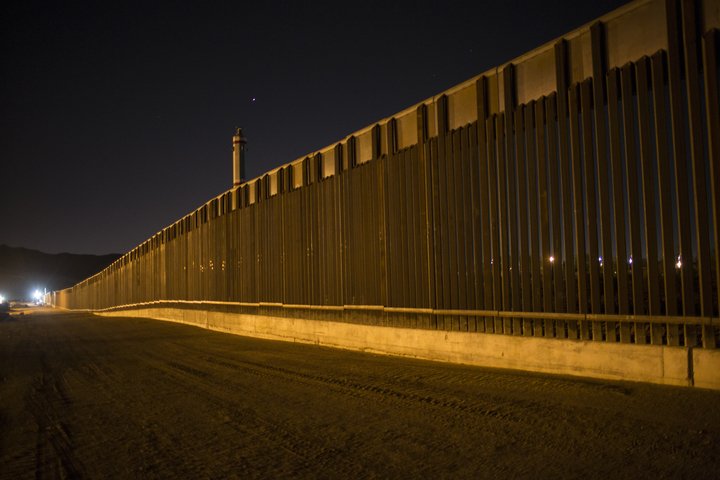
President Donald Trump has quietly transferred more than $200 million from Pentagon counterdrug efforts toward building his long-promised wall along the U.S.-Mexico border, drawing protests from Democrats who say he is again abusing his powers. The move would shift $129 million to wall construction from anti-drug efforts in Afghanistan — the source of perhaps 90 percent of the world’s heroin — along with $90 million freed up by passage of a stopgap funding bill, top Democrats said in a letter to Secretary of Defense Mark Esper. The Defense Department “was faced with a simple choice: either additional funds be used for their intended purpose, to accelerate our military’s efforts to combat heroin production in Afghanistan; or divert these funds to pay for cost increases of a border wall project that does not have the support of the American people,” the Democrats wrote. Senator Dick Durbin of Illinois, Chuck Schumer of New York and Patrick Leahy of Vermont took the lead, noting that the heroin trade is a major funding source for the Taliban and urging the Pentagon to “redouble its efforts to starve the Taliban of a vital funding source and reduce the scourge of heroin abuse in this country and abroad.” Trump has shifted more than $6 billion from Pentagon accounts to pay for border fence construction, considerably more than lawmakers have provided through annual appropriations bills. Wall funding has been a major source of conflict between Capitol Hill Democrats and Trump as they negotiate agency funding bills each year. For instance, Trump was forced to settle for just $1.4 billion in wall funding in talks this winter. He issued a controversial declaration of a national emergency shortly afterward that allowed him to shift almost three times as much money from military construction accounts to wall building. A fight over the wall issue is tying up efforts to begin serious negotiations on wrapping up $1.4 trillion worth of agency appropriations by Thanksgiving. Separately, the Senate is expected to vote Thursday to sustain Trump’s veto Tuesday of legislation to reject his emergency declaration. By Andrew Taylor Associated Press Republished with the permission of the Associated Press.
White House and democrats fight over rules for impeachment
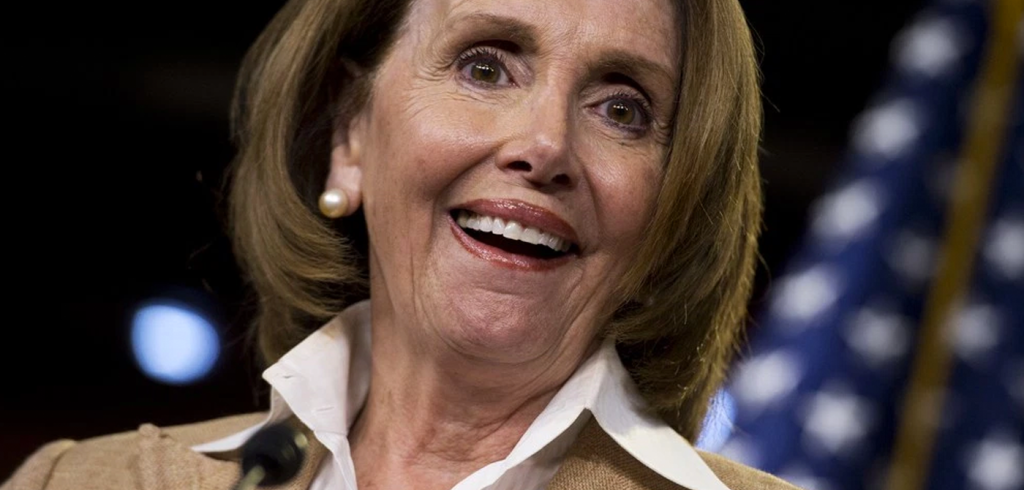
The U.S. Constitution gives the House “the sole power of impeachment” — but it confers that authority without an instruction manual. Now comes the battle royal over exactly what it means. In vowing to halt all cooperation with House Democrats’ impeachment inquiry, the White House on Tuesday labeled the investigation “illegitimate” based on its own reading of the Constitution’s vague language. In an eight-page letter, White House counsel Pat Cipollone pointed to House Speaker Nancy Pelosi’s failure to call for an official vote to proceed with the inquiry as grounds to claim the process a farce. “You have designed and implemented your inquiry in a manner that violates fundamental fairness and constitutionally mandated due process,” Cipollone wrote. But Douglas Letter, a lawyer for the House Judiciary Committee, told a federal judge Tuesday that it’s clear the House “sets its own rules” on how the impeachment process will play out. The White House document lacked much in the way of legal arguments, seemingly citing cable TV news appearances as often as case law. And legal experts cast doubt upon its effectiveness. “I think the goal of this letter is to further inflame the president’s supporters and attempt to delegitimize the process in the eyes of his supporters,” said Stephen Vladeck, a law professor at the University of Texas. Courts have been historically hesitant to step in as referee for congressional oversight and impeachment. In 1993, the Supreme Court held that impeachment was an issue for the Congress and not the courts. In that case, Walter Nixon, a federal district judge who was removed from office, sought to be reinstated and argued that the full Senate, instead of a committee that was established to hear testimony and collect evidence, should have heard the evidence against him. The court unanimously rejected the challenge, finding impeachment is a function of the legislature that the court had no authority over. As for the current challenge to impeachment, Vladeck said the White House letter “does not strike me as an effort to provide sober legal analysis.” Gregg Nunziata, a Philadelphia attorney who previously served as general counsel and policy adviser to Republican Sen. Marco Rubio, said the White House’s letter did not appear to be written in a “traditional good-faith back and forth between the legislative and executive branches.” He called it a “direct assault on the very legitimacy of Congress’ oversight power.” “The Founders very deliberately chose to put the impeachment power in a political branch rather the Supreme Court,” Nunziata told The Associated Press. “They wanted this to be a political process and it is.” G. Pearson Cross, a political science professor at the University of Louisiana at Lafayette, said the letter appeared to act as nothing more than an accelerant on a smoldering fire. “It’s a response that seems to welcome a constitutional crisis rather than defusing one or pointing toward some strategy that would deescalate the situation,” Cross said. After two weeks of a listless and unfocused response to the impeachment probe, the White House letter amounted to a declaration of war. It’s a strategy that risks further provoking Democrats in the impeachment probe, setting up court challenges and the potential for lawmakers to draw up an article of impeachment accusing President Donald Trump of obstructing their investigations. Democrats have said that if the White House does not provide the information, they could write an article of impeachment on obstruction of justice. It is unclear if Democrats would wade into a lengthy legal fight with the administration over documents and testimony or if they would just move straight to considering articles of impeachment. House Intelligence Committee Chairman Adam Schiff, Democrat – California, who is leading the Ukraine probe, has said Democrats will “have to decide whether to litigate, or how to litigate.” But they don’t want the fight to drag on for months, as he said the Trump administration seems to want to do. A federal judge heard arguments Tuesday on whether the House had undertaken a formal impeachment inquiry despite not having taken an official vote and whether it can be characterized, under the law, as a “judicial proceeding.” The distinction matters because while grand jury testimony is ordinarily secret, one exception authorizes a judge to disclose it in connection with a judicial proceeding. House Democrats are seeking grand jury testimony from special counsel Robert Mueller’s Russia investigation as they conduct the impeachment inquiry. By Jonathan Lemire, Jim Mustian and Mike Balsamo Associated Press Mustian reported from New York. Associated Press writer Eric Tucker contributed to this report. Republished with the permission of the Associated Press.
Democrats approve new bylaws amid internal feud

Members of the Alabama Democratic Party’s governing board on Saturday approved new bylaws and scheduled new leadership elections amid an ongoing internal feud that appears eventually destined for court. State Democratic Executive Committee members called their own meeting to comply with a directive from the Democratic National Committee officials to update bylaws to provide representation of more minorities — not just African Americans. The more than 75 committee members in attendance gave a standing ovation after the bylaws were adopted. “We are attempting to rebuild our party so we can be competitive in Alabama politics again,” Rep. Chris England, who was elected to preside over the meeting, told reporters afterward. “Hopefully, we will see a Democratic Party that is embracing all Democrats.” The Saturday action came after a longstanding power struggle within the party that has pitted longstanding leaders against a coalition fighting for changes. Alabama Democratic Party Chair Nancy Worley and Joe Reed, the party’s vice-chair of minority affairs, did not attend the meeting, which Worley argued was not properly called. “I do not consider this to be an official meeting of the SDEC. I look forward to next Saturday’s SDEC meeting,” Worley wrote in a text message. The State Democratic Executive Committee has more than 200 members. Organizers said a majority agreed to the meeting, and they met the attendance threshold to conduct business. “We followed the rules. We abided by all the requirements in the old bylaws. I think we are in the right,” England said. But asked the chances that the dispute will end up in litigation, England responded “100 percent.” Members in attendance on Saturday offered different views on whether to attend the Oct. 12 meeting called by Worley. The DNC last year directed the state party to update party bylaws and hold new elections for chair and vice-chair. The DNC has indicated the state party’s ability to participate in the national convention is in jeopardy unless the changes are made. Despite the predictions of a messy legal fight to come, the mood in the Montgomery ballroom was jubilant as a bloc of the Democratic Party that has long pushed for changes was able to make some. A few members had blue T-shirts with the slogan “Nancy Worley Says I’m Going To Hell,” a reference to earlier comments by Worley. Worley has framed the bylaw dispute as an effort to reduce the power of African Americans within the party. She told a DNC panel they would face a “special circle in hell” for doing so. Rep. Napoleon Bracy, one of three African American lawmakers that were among committee members that submitted the proposed new bylaws to the DNC, said it is important that the state party be a “big tent” that mirrors the state. The new bylaws set up diversity caucuses to nominate Hispanics, LGBTQ individuals and others to the SDEC. Democrats in recent years have lost all statewide elections in Alabama with the exception of the 2017 election of U.S. Sen. Doug Jones. Some Democrats have expressed dissatisfaction in the current leadership’s efforts to fundraise and promote Democrats’ candidates and message. Jones issued a statement through his campaign calling it a “major step in the right direction.” State committee member Susan Cobb of Marion County said new leadership will hopefully mean “a more active party, not only on the ground but on social media.” “Every time the Republicans screw up, which happens all the time, you would have an immediate Democratic response instead of sitting there and saying nothing,” Cobb said. Republished with the permission of the Associated Press.
Democrats call October 5th meeting on party bylaws
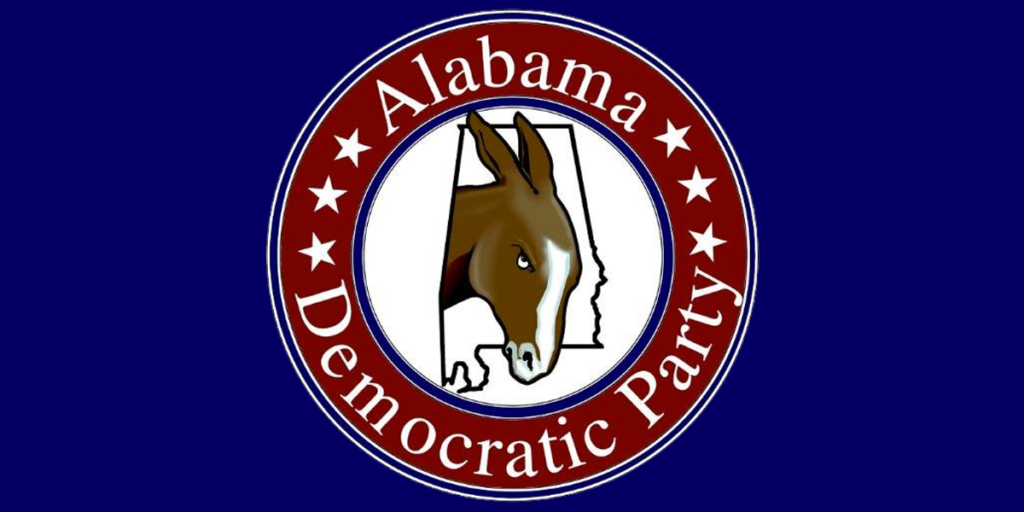
The Alabama Democratic Party’s governing board has called a Saturday meeting to vote on new party bylaws. U.S. Sen. Doug Jones’ campaign confirmed Tuesday that a majority of members of the State Democratic Executive Committee called for the meeting. The Jones campaign says the show of support from SDEC members across the state “is the first step in creating a more transparent, diverse and inclusive Alabama Democratic Party and complying with the DNC guidelines.” The Democratic National Committee in February ordered Alabama to bring bylaws into compliance and to hold new chair and vice-chair elections. A DNC panel gave the state an Oct. 5 deadline to approve new bylaws so it could hold new elections. Alabama Democratic Party Chair Nancy Worley scheduled a meeting for Oct. 12. Republished with the permission of the Associated Press.

